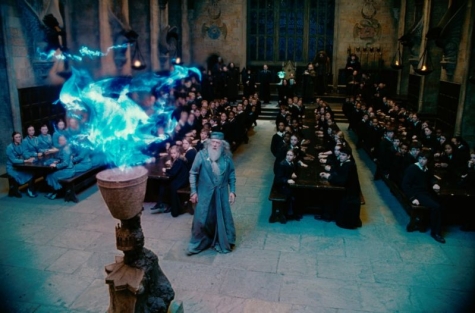Harry Potter was a series that had many highs and lows. Spanning 10 years, 8 movies, and 7 books, it’s impossible not to compare them. In short, here’s how I rank the Harry Potter movies:
- Prisoner of Azkaban
- Deathly Hallows Part 2
- Sorcerer’s (Philosopher’s) Stone
- Order of the Phoenix
- Half Blood Prince
- Deathly Hallows Part 1
- Chamber of Secrets
- Goblet of Fire
It’s a pity, because Goblet of Fire has the most interesting premise of the series. It’s problem comes primarily from taking our “suspension of disbelief” too far. Many franchises use this a mechanism within the world, but it only works when you play by the rules of the world. Harry Potter and the Goblet of Fire is what we get when creators choose to ignore the rules of the established world.

Fundamental Character Changes
Ron Weasley, embodiment of loyalty for the series so far, has gone far out of his comfort zone for Harry and Hermione. This is what makes his leaving in Deathly Hallows that much more intense, he finally reached his breaking point. However, in Goblet of Fire, it’s forced. We understand he’s tired of being the sidekick, but his abandonment of Harry, and out of character moments that follow, break away from his establishment. Instead, he should have been an active contributor to assisting Harry in the first task, so that when he’s taken away for the second we actually miss his presence. Imagine Harry and Ron fight, then Ron is taken away from Harry. Imagine Ron is felt inferior at the Yule Ball because his date would rather be with Harry.
No Focus
This movie is quite shallow, which is especially annoying because the book has far more emotional depth. Let’s not get into comparing the two though, and focus on the movie. The brilliance of GoF’s concept is that Harry finally hopes to have a quiet year for a change. Harry is beginning to develop feeling for Cho, and now he has to contend with the worst possible situations. Again, he is thrown out of his depth. Unfortunately this feels secondary, rather a focus has been put on the action and spectacle of Harry Potter’s world. The death of Barty Crouch is also handled poorly, seeming to have little impact on the story 5 minutes later.
Plot Lines Are Forgotten
As soon as Harry’s name flew from the Goblet we had a sense of trepidation. The setup is suspicion and caution, but it seems to dissipate as quickly as it appeared. Harry is forced to compete, but why? We are told “it is a binding contract”, but never receive any reason why, or what consequences there will be for walking away. Is it worth facing death? What if Harry did walk away, and we see some kind of change in him? A consequence for this action that would compel him to compete. Whilst he competes, Ron and Hermione try and get him out of the contract, and investigate who might have set him up. Plots are setup, but only a few are used.
Anticlimax
Ralph Fiennes as Voldemort was perfect casting. He had the malice and danger we wanted, after it had been set up previous movies. However, his eventual return is… weak. There’s no drama, no spectacle, he comes back, and they fight, and deus ex machina saves the day. It feels like there was no consequence to his rise. Cedric wasn’t a lovable character, so his death is empty. As the movie ends there is no dark undertone to what will follow moving forward.
Many movies use the suspension of disbelief mechanism (Fast and Furious, Superhero Franchises, etc), but when you don’t play by your own rules, all you get is missed opportunities for greatness.




One thought on “Film Analysis: Harry Potter and the Suspension of Disbelief Part 1”